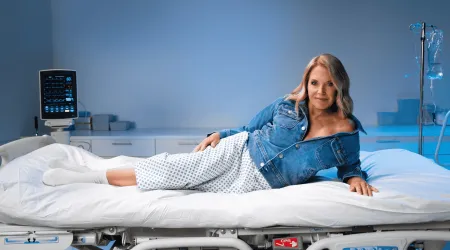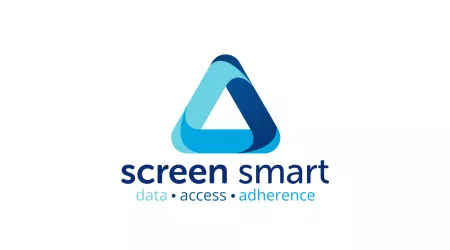
Haleema Burton: Why timely screening matters even without symptoms

Haleema Burton turned 45 in March. She was aware the recommended colonoscopy screening age had been lowered to 45 and happened to have some extra time to check things off her to-do list. It was fortunate that she made time to get screened because what she thought would be a routine screening turned out to be a colorectal cancer diagnosis.
“It was a shock because no one in my family had cancer, that I knew of,” Haleema said. “Initially, they told me that they found a polyp and an inverted diverticula – both benign – in my colon, and I left the procedure feeling great. A week later, I got a call from my gastroenterologist saying the polyp that was removed had cancer cells.”
Pathology showed a stage I colorectal cancer diagnosis. Within a matter of weeks, Haleema was being prepped for surgery.
“Things just moved really fast after that,” Haleema said. “Your mind starts going in a thousand different directions. I started thinking about the possibility of end-of-life and how to tell my family.”
Breaking Down Stigmas & Opening up the Dialogue
Most people can agree that talking about your bowels is uncomfortable. Haleema struggled with whether she wanted to share this information with her loved ones. Ultimately, she chose to speak up and work toward eliminating stigmas.
“I decided not to keep quiet about it,” Haleema said. “The fact that it was my first colonoscopy and I got this diagnosis compelled me to tell others about it. I knew there were so many people in my circle that were my age and older who put off their screening. I figured if I could help even one person avoid this fate, it would be worth any temporary embarrassment I might feel.”
Because Haleema decided to make some noise about the second deadliest cancer, at least three of her friends have since scheduled their colonoscopies.
“You don’t need to have symptoms or multiple polyps to have issues,” Haleema said. “I’ve had friends who had multiple polyps in their colon with no cancer cells. You just never know until you get checked.”
From Cancer Patient to Survivor to Volunteer (In Less Than 3 Months)
Haleema turned her adversity into a passion for helping others and started volunteering with the Alliance through the BOSS volunteer group. An affinity group of the Colorectal Cancer Alliance, BOSS stands for the Black Outreach Subcommittee for Screening, Access, and Advocacy Taskforce (BOSS).
“The fact that I was diagnosed without any sort of warning from family history or symptoms was a wakeup call,” Haleema said. “Not enough people are talking about CRC, especially in the Black community, we like to keep our health issues to ourselves. But we’ve had major Black celebrities die from this disease.”
Haleema, a Black woman herself, points out another significant complication of the Black community that may account for part of their higher rates of colorectal cancer diagnosis.
“As African Americans, we may not always know all of our genetic history,” Haleema said. “Some CRC diagnoses are genetically linked, and it is important to understand the potential for anyone at almost any age to be diagnosed with CRC. This alone is a reason why we need to talk about it. It affects everybody who has a colon.”
What Haleema Wants Others To Know
Haleema now stresses to others how important it is to get screened. Her surgical oncologist told her she was the “poster child” for preventive screening.
“I was otherwise healthy and active. Because they found my cancer at age 45 when I was eligible to get my first screening, I was able to beat cancer,” Haleema said.
Haleema said she hadn’t always been proactive with her health, often ignoring symptoms when they arose. It happened to be a coincidence of various circumstances that her colonoscopy even got scheduled in the first place, she said.
“I hope that people experiencing any sort of symptoms will listen to their bodies and advocate for getting a colonoscopy before turning 45,” Haleema said.
Because Haleema was diagnosed early, she did not require any additional surgery, chemotherapy, or radiation to cure her disease.
For Those Still Hesitant About Getting a Colonoscopy
It’s a lot easier to prevent colorectal cancer than it is to cure it. Thankfully, because Haleema was diagnosed, she was able to recover fairly quickly. Now she shares her experience in hopes of helping others prevent a cancer diagnosis.
Haleema wants anyone who might be hesitant about getting a colonoscopy to know just how easy and painless the process can be. Oftentimes, people don’t get colonoscopy screenings due to fear and anxiety about the prep and procedure.
It's important to note that other colorectal cancer screening tests are also available. These include an annual fecal immunochemical test (FIT), which checks for hidden blood in the stool, or a fecal DNA test that detects cancer and certain polyps. The best test is the one someone is willing to take.
“No one wants to have butt issues,” Haleema said. “It comes with so much stigma. But, we have to move past this. It moves fast if you ignore it.”
If you’re uncertain about when you should be getting a colonoscopy, make sure to check out the Alliance’s free online screening tool.
While the general recommendations are to get screened at age 45, it’s important to speak to your doctor sooner should you have certain symptoms, medical conditions, or a family history of colorectal cancer. Haleema didn’t have any of those, but because she got her screening on time, she’s here to tell her story.
The positions and statements are based on Haleema Burton's experiences, thoughts, and opinions. Please talk to your doctor regarding this important topic.
This article was sponsored by Olympus Corporation of the Americas.
Top resources

National Cancer Prevention Month: Majority View Encouraging Screening as an Act of Love
Americans increasingly view colorectal cancer screening encouragement as an act of love, with new survey data showing rising openness about lifesaving prevention.

Katie Couric Joins the Colorectal Cancer Alliance To ‘LEAD FROM BEHIND’
Katie Couric joins the Colorectal Cancer Alliance and Ryan Reynolds’ Maximum Effort to expand LEAD FROM BEHIND, a star-powered campaign breaking stigma and urging lifesaving colon cancer screening. Colon cancer is the preventable cancer.

20+ Colorectal Cancer Alliance Screen Smart Partners Encourage Secretary Kennedy to Uphold USPSTF Goal to Improve Health
The Colorectal Cancer Alliance and more than 20 Screen Smart partners urge HHS Secretary Robert F. Kennedy Jr. to protect USPSTF’s evidence-based process and no-cost preventive screenings like colorectal cancer screening, which save lives and improve national health.





